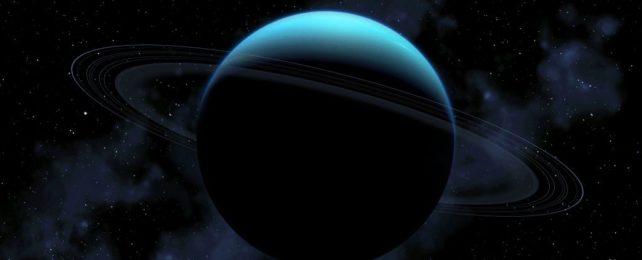Asking the internet to name a scientific mission has become something of a tradition, but we think even the bravest might quail at a recent ask on Twitter.
An unofficial Twitter account promoting future missions to our Solar System's ice giants, Ice Giant Missions, requested suggestions for what to name a probe sent to Uranus.
Given the potential puns that are inevitably attached to Uranus, this is dangerous territory, even beyond the expected "Something McSomethingface". That, of course, was among the top answers, but with ground as fertile as Uranus, why flog a dead horse?
Surprisingly, however, the butt jokes appear to be in the minority, with many respondents taking the question in good faith, and answering accordingly.
There was:
— Ice Giant Missions 🛰 (@ExploreIGO) September 10, 2022
Voyager - @NSFVoyager2 🌌
Cassini-Huygens - @CassiniSaturn 🪐
New Horizons - @NASANewHorizons 🖤
Juno - @NASAJuno 🟠
Perseverance - @NASAPersevere 🔴
We want to know, what would YOU name the #Uranus Orbiter & Probe Mission? ⚪️🛰️#letsgoback #icegiants #namethemission pic.twitter.com/o6vLLgdvMo
A mission to Uranus is not currently in development, but nor is it entirely a pipe dream. Missions have been sent, by now, to most planets in the Solar System. Mercury, Venus, Mars, Jupiter, and Saturn have all been visited and surveyed by dedicated probes. Even Jupiter's moons are getting a mission.
The ice giants, on the other hand, have been somewhat neglected. Earlier this year, this led a panel of experts from the US National Academies to recommend a mission to Uranus in its decadal report to NASA.
In fact, so important is Uranus deemed that the panel, out of all its recommendations, gave the stinky planet top priority.
"Uranus is one of the most intriguing bodies in the Solar System," the scientists wrote. "Its low internal energy, active atmospheric dynamics, and complex magnetic field all present major puzzles.
"A primordial giant impact may have produced the planet's extreme axial tilt and possibly its rings and satellites, although this is uncertain. Uranus's large ice-rock moons displayed surprising evidence of geological activity in limited Voyager 2 flyby data, and are potential ocean worlds."
If we can't reuse Herschel, the obvious choice, then how about:
— Corey S. Powell (@coreyspowell) September 10, 2022
Caelus (Greek version of Uranus)
Bode (who calculated its orbit)
Lassell (discovered Ariel)
Kuiper (for many reasons!)
Tempest (my personal favorite--keeps the Shakespeare theme going)
This mission concept is currently going by the name Uranus Orbiter and Probe (UOP) – but other Solar System missions can have catchier names.
Mars has (or has had) Spirit, Opportunity, Curiosity, and Perseverance. BepiColombo is currently en route to Mercury, while Akatsuki (a Japanese word meaning "dawn") currently orbits Venus. Saturn had Cassini-Huygens. Jupiter has the Juno probe – named after the Roman goddess queen, married to Jupiter. The Voyager probes have left the Solar System; New Horizons is following.
There doesn't seem to be much in the way of naming convention between these missions, which means there's room for creativity in naming the Uranus probe. Top contenders include astronomers who discovered Jupiter (William Herschel) and some of its moons (William Lassell and Gerard Kuiper).
WOW 😍! Butt jokes aside, SUPER impressed with all the great #Uranus Orbiter & Probe name suggestions so far! Have so many favorites already! ⚪️🛰️#letsgoback #icegiants pic.twitter.com/QneOxv7tem
— Ice Giant Missions 🛰 (@ExploreIGO) September 11, 2022
There are also famous explorers – polar explorer Roland Amundsen, mountaineer Tenzing Norgay, or Ipirvik-Taqulittuq after the 19th century Inuk husband and wife who served as guides and interpreters for white Arctic explorers.
If we want to veer away from naming the probe after people, a practice that can become fraught, other options are somewhat more poetic. There's Caelus, the ancient Roman counterpart to Greek god Uranus. Or Odin, the Norse god who defeated the ice giants of myth.
What seemed to be the most popular suggestion was Tempest. This is because a number of Uranus' 27 moons are named after Shakespeare characters, with the greatest proportion – nine (or 10, if you count Ariel) from The Tempest.
Whatever the name, the mission would reveal more information about one of the most enigmatic worlds in the Solar System.
How did Uranus end up tipped sideways, and spinning in the opposite direction to the other planets? Why does it have rings like nothing else in the Solar System? What's with the weird X-rays coming out of it? And why is its magnetic field such a mess?
With all these burning questions, one can almost forget what a silly name the planet has in English to start with.
